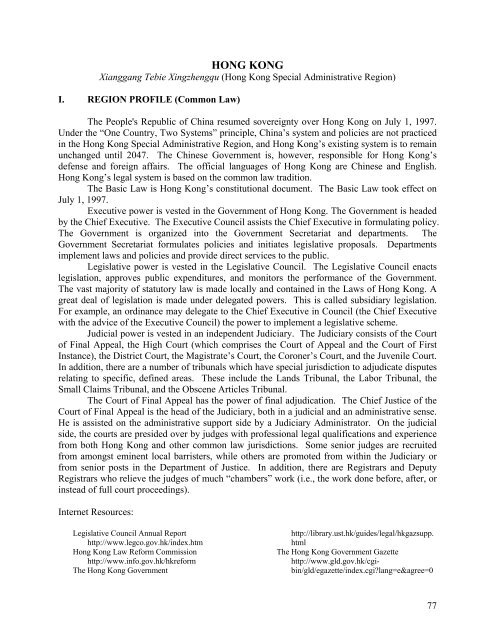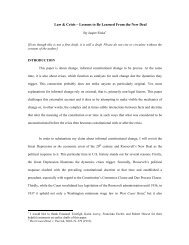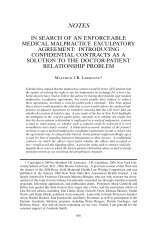Guide to Foreign and International Legal Citations - New York ...
Guide to Foreign and International Legal Citations - New York ...
Guide to Foreign and International Legal Citations - New York ...
You also want an ePaper? Increase the reach of your titles
YUMPU automatically turns print PDFs into web optimized ePapers that Google loves.
HONG KONG<br />
Xianggang Tebie Xingzhengqu (Hong Kong Special Administrative Region)<br />
I. REGION PROFILE (Common Law)<br />
The People's Republic of China resumed sovereignty over Hong Kong on July 1, 1997.<br />
Under the “One Country, Two Systems” principle, China’s system <strong>and</strong> policies are not practiced<br />
in the Hong Kong Special Administrative Region, <strong>and</strong> Hong Kong’s existing system is <strong>to</strong> remain<br />
unchanged until 2047. The Chinese Government is, however, responsible for Hong Kong’s<br />
defense <strong>and</strong> foreign affairs. The official languages of Hong Kong are Chinese <strong>and</strong> English.<br />
Hong Kong’s legal system is based on the common law tradition.<br />
The Basic Law is Hong Kong’s constitutional document. The Basic Law <strong>to</strong>ok effect on<br />
July 1, 1997.<br />
Executive power is vested in the Government of Hong Kong. The Government is headed<br />
by the Chief Executive. The Executive Council assists the Chief Executive in formulating policy.<br />
The Government is organized in<strong>to</strong> the Government Secretariat <strong>and</strong> departments. The<br />
Government Secretariat formulates policies <strong>and</strong> initiates legislative proposals. Departments<br />
implement laws <strong>and</strong> policies <strong>and</strong> provide direct services <strong>to</strong> the public.<br />
Legislative power is vested in the Legislative Council. The Legislative Council enacts<br />
legislation, approves public expenditures, <strong>and</strong> moni<strong>to</strong>rs the performance of the Government.<br />
The vast majority of statu<strong>to</strong>ry law is made locally <strong>and</strong> contained in the Laws of Hong Kong. A<br />
great deal of legislation is made under delegated powers. This is called subsidiary legislation.<br />
For example, an ordinance may delegate <strong>to</strong> the Chief Executive in Council (the Chief Executive<br />
with the advice of the Executive Council) the power <strong>to</strong> implement a legislative scheme.<br />
Judicial power is vested in an independent Judiciary. The Judiciary consists of the Court<br />
of Final Appeal, the High Court (which comprises the Court of Appeal <strong>and</strong> the Court of First<br />
Instance), the District Court, the Magistrate’s Court, the Coroner’s Court, <strong>and</strong> the Juvenile Court.<br />
In addition, there are a number of tribunals which have special jurisdiction <strong>to</strong> adjudicate disputes<br />
relating <strong>to</strong> specific, defined areas. These include the L<strong>and</strong>s Tribunal, the Labor Tribunal, the<br />
Small Claims Tribunal, <strong>and</strong> the Obscene Articles Tribunal.<br />
The Court of Final Appeal has the power of final adjudication. The Chief Justice of the<br />
Court of Final Appeal is the head of the Judiciary, both in a judicial <strong>and</strong> an administrative sense.<br />
He is assisted on the administrative support side by a Judiciary Administra<strong>to</strong>r. On the judicial<br />
side, the courts are presided over by judges with professional legal qualifications <strong>and</strong> experience<br />
from both Hong Kong <strong>and</strong> other common law jurisdictions. Some senior judges are recruited<br />
from amongst eminent local barristers, while others are promoted from within the Judiciary or<br />
from senior posts in the Department of Justice. In addition, there are Registrars <strong>and</strong> Deputy<br />
Registrars who relieve the judges of much “chambers” work (i.e., the work done before, after, or<br />
instead of full court proceedings).<br />
Internet Resources:<br />
Legislative Council Annual Report<br />
http://www.legco.gov.hk/index.htm<br />
Hong Kong Law Reform Commission<br />
http://www.info.gov.hk/hkreform<br />
The Hong Kong Government<br />
http://library.ust.hk/guides/legal/hkgazsupp.<br />
html<br />
The Hong Kong Government Gazette<br />
http://www.gld.gov.hk/cgibin/gld/egazette/index.cgi?lang=e&agree=0<br />
77
















